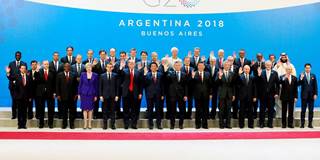Although the G20 has made a limited effort to broaden its engagement with Africa in recent years, it has yet to include Africans in discussions of global issues that bear directly on their own economic prospects. Yet by consistently treating the region as a ward instead of a coequal partner, the international community is undermining its own future interests.
CAPE TOWN – This has not been an easy year for the G20. The 2018 summit of the leaders of the world’s largest economies is being held in Buenos Aires, a city still reeling from a currency collapse. More broadly, the summit is taking place amid a fracturing of the multilateral order. Everything from NATO to the consensus on climate change appears to be coming apart at the seams.
Still, the G20 has long positioned itself as a global problem solver, having been conceived after the 1997 Asian financial crisis and then emerging as the primary global forum for addressing the crash of 2008. A decade later, a global crisis is on the agenda once again, only this time it has assumed the form of a mounting trade war between the United States and China.
Unlike in 2008, however, the world’s capacity for multilateral decision-making is deteriorating. The European Union remains preoccupied with its own internal disputes, and the United States, under President Donald Trump, has abandoned multilateralism and weakened the institutions needed to solve complex challenges such as the threat of technological unemployment from automation. And the effects of the Trump administration’s protectionism are already being felt. The World Trade Organization recently reported that in response to US tariffs, G20 countries have imposed around 40 new import restrictions, affecting $481 billion in global trade – a sixfold increase from the year before.

CAPE TOWN – This has not been an easy year for the G20. The 2018 summit of the leaders of the world’s largest economies is being held in Buenos Aires, a city still reeling from a currency collapse. More broadly, the summit is taking place amid a fracturing of the multilateral order. Everything from NATO to the consensus on climate change appears to be coming apart at the seams.
Still, the G20 has long positioned itself as a global problem solver, having been conceived after the 1997 Asian financial crisis and then emerging as the primary global forum for addressing the crash of 2008. A decade later, a global crisis is on the agenda once again, only this time it has assumed the form of a mounting trade war between the United States and China.
Unlike in 2008, however, the world’s capacity for multilateral decision-making is deteriorating. The European Union remains preoccupied with its own internal disputes, and the United States, under President Donald Trump, has abandoned multilateralism and weakened the institutions needed to solve complex challenges such as the threat of technological unemployment from automation. And the effects of the Trump administration’s protectionism are already being felt. The World Trade Organization recently reported that in response to US tariffs, G20 countries have imposed around 40 new import restrictions, affecting $481 billion in global trade – a sixfold increase from the year before.